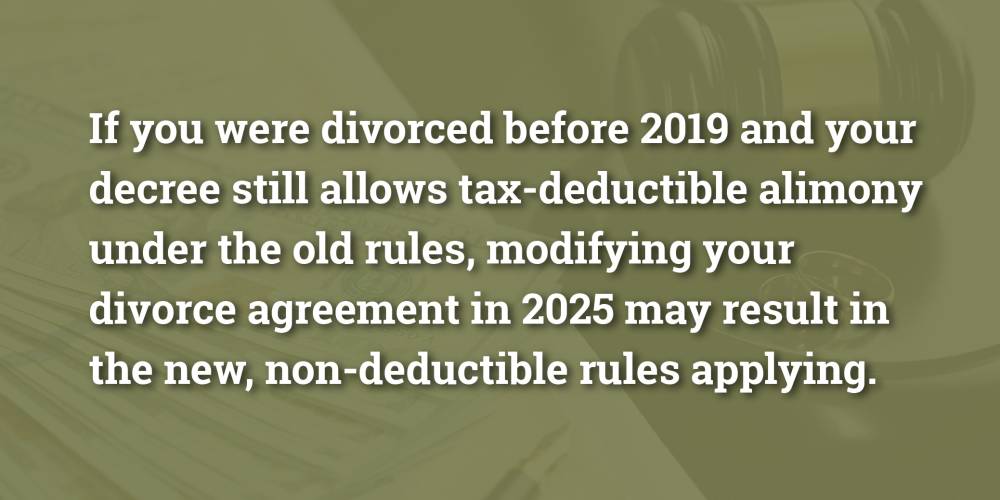630-462-9500
After Hour New Client Telephone Number 630-690-6077
1776 S. Naperville Road, Building B, Suite 202,
Wheaton, IL 60189
5 Facts About Alimony in a 2025 Divorce
 If you are preparing for a divorce in Illinois, the issue of spousal maintenance (also known as alimony or spousal support) may be one of your biggest concerns. Whether you are likely to pay or receive support, it is important to understand how the law works, what courts consider, and how recent updates may impact your case.
If you are preparing for a divorce in Illinois, the issue of spousal maintenance (also known as alimony or spousal support) may be one of your biggest concerns. Whether you are likely to pay or receive support, it is important to understand how the law works, what courts consider, and how recent updates may impact your case.
Whether you anticipate paying or receiving alimony, having an experienced, aggressive DuPage County, IL divorce attorney on your side is an important first step. Here are five essential things to know about spousal maintenance in a 2025 Illinois divorce, particularly in DuPage County.
Illinois Courts Do Not Award Alimony Automatically
Unlike child support, which follows strict formulas when minor children are involved, spousal maintenance is never guaranteed in a divorce. The court must first decide whether one spouse is entitled to maintenance at all. This decision is governed by Section 504 of the Illinois Marriage and Dissolution of Marriage Act (750 ILCS 5/504).
Judges in DuPage County consider many factors when deciding whether to award alimony, including the length of the marriage, the standard of living during the marriage, each spouse’s age, health, and income, and whether one spouse gave up career opportunities to raise shared children.
Judges Can Use a Formula to Set Alimony Payments
If the court decides spousal maintenance is appropriate, it will likely use a statutory formula to determine the amount and duration, unless the couple’s combined gross income is above $500,000 or either party has a prior support obligation.
Under the formula, maintenance is calculated as 33 1/3 percent of the paying spouse’s net annual income minus 25 percent of the receiving spouse’s net annual income. Additionally, payments cannot exceed 40 percent of the spouses’ combined net income.
The duration of payments depends on the length of the marriage. The law sets a multiplier based on how long you were married before filing for divorce. For example:
-
A marriage of five years may result in a maintenance award for about 20 percent of the length of the marriage.
-
A marriage of 15 years may result in maintenance lasting 60 percent of the marriage.
-
For marriages lasting 20 years or more, the court can award permanent maintenance or maintenance for a term equal to the length of the marriage.
These calculations are outlined in 750 ILCS 5/504(b-1), which provides specific information about how long alimony should be paid. However, the judge can deviate from these guidelines if doing so is fair and justified.
Alimony Is No Longer Tax-Deductible
Since the passage of the Tax Cuts and Jobs Act in 2017, alimony awards finalized after January 1, 2019 are no longer tax-deductible for the paying spouse. Likewise, the recipient does not count payments as taxable income.
This rule change has major consequences in divorce planning. A paying spouse can no longer reduce their tax liability by paying maintenance, and the receiving spouse may actually receive less because there is no longer a tax incentive to pay more.
If you were divorced before 2019 and your decree still allows tax-deductible alimony under the old rules, be aware that modifying your divorce agreement in 2025 may result in the new, non-deductible rules applying. Always speak with an experienced attorney before asking for a change.

Alimony Can Be Temporary, Reviewable, or Permanent
Spousal maintenance is not usually meant to last forever. In fact, many awards are reviewable or rehabilitative, which means they are only intended to give one spouse time to become financially self-sufficient after divorce.
A judge might order maintenance for a set period with a scheduled review. At that time, both parties may return to court to present updated financial information. The court can then extend, modify, or terminate support.
Permanent maintenance is usually reserved for long marriages or situations where the recipient is unlikely to become self-supporting due to age, disability, or other significant limitations. Even then, "permanent" may not mean forever. Maintenance can be terminated if the recipient remarries or cohabits with a new partner, or if either party dies.
In all cases, it is essential to review the terms of your divorce judgment closely. A skilled attorney can help you structure a maintenance award that meets your needs and avoids surprises down the road.
You Can Agree to Waive or Change Alimony
Illinois law allows divorcing couples to create their own agreement about spousal maintenance. If both parties agree to waive maintenance, and that waiver is entered in the final divorce decree, it is generally permanent and cannot be undone later, even if financial circumstances change.
For this reason, waiving maintenance should never be done lightly. In some cases, people waive support in exchange for a greater share of marital assets, such as equity in the home or retirement funds. Others may agree to waive future claims because both spouses are fully self-supporting.
It is also possible to agree to modifiable maintenance. This gives either party the ability to return to court later if there is a substantial change in circumstances, such as job loss, disability, or retirement. You can also include specific terms that limit when and how the court can revisit maintenance.
Contact a Wheaton, IL Spousal Maintenance Attorney
Spousal maintenance is one of the most disputed issues in Illinois divorce law. With statutory formulas, tax law changes, and a range of options for duration and modification, it is essential to approach the issue strategically. If you are negotiating maintenance in your divorce, or facing a request for it, work with an attorney who understands Illinois law and the practices of the local courts.
At The Stogsdill Law Firm, P.C., we understand that alimony is not just a legal question. For most individuals going through divorce, alimony is also a deeply personal and financial issue. Our DuPage County, IL divorce attorney has over 40 years of family law experience and offers clients personalized services through close communication. We focus on clear solutions and amicable resolutions whenever possible. To get started, call 630-462-9500 today for a confidential consultation.




















